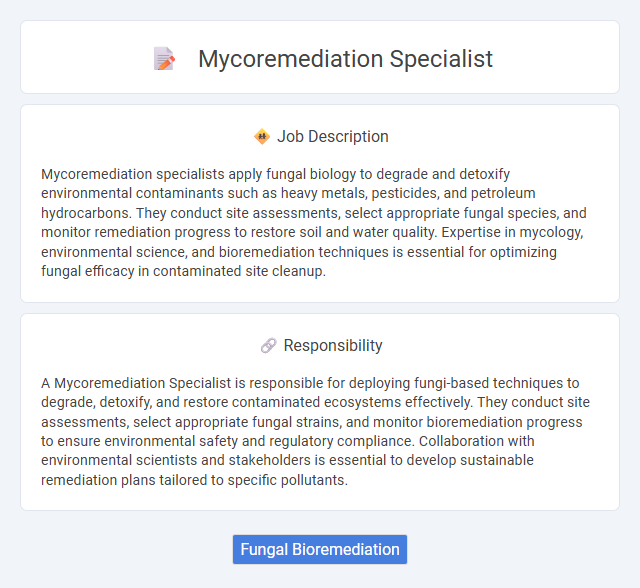
Mycoremediation specialists apply fungal biology to degrade and detoxify environmental contaminants such as heavy metals, pesticides, and petroleum hydrocarbons. They conduct site assessments, select appropriate fungal species, and monitor remediation progress to restore soil and water quality. Expertise in mycology, environmental science, and bioremediation techniques is essential for optimizing fungal efficacy in contaminated site cleanup.
Individuals with a strong interest in environmental science and biology are likely suitable for a mycoremediation specialist role, as the job often requires detailed analysis and hands-on work with fungi to detoxify contaminated sites. Candidates who are comfortable working outdoors in varying conditions and possess patience for long-term research and fieldwork tend to perform well in this field. Those who may struggle are likely individuals who prefer primarily office-based, routine tasks or have limited endurance for physical and sometimes challenging environmental settings.
Qualification
Mycoremediation specialists require a strong background in environmental science, microbiology, or mycology, typically holding a bachelor's or master's degree in one of these fields. Expertise in fungal biology, soil science, and pollutant degradation mechanisms is essential for designing and implementing effective fungal-based remediation projects. Proficiency in laboratory techniques, data analysis, and environmental regulations ensures compliance and optimizes the bioremediation process for contaminated sites.
Responsibility
A Mycoremediation Specialist is responsible for deploying fungi-based techniques to degrade, detoxify, and restore contaminated ecosystems effectively. They conduct site assessments, select appropriate fungal strains, and monitor bioremediation progress to ensure environmental safety and regulatory compliance. Collaboration with environmental scientists and stakeholders is essential to develop sustainable remediation plans tailored to specific pollutants.
Benefit
A Mycoremediation specialist likely enhances environmental cleanup by using fungi to degrade contaminants, increasing the efficiency of bioremediation processes. This approach probably reduces reliance on chemical treatments, leading to safer, eco-friendly solutions for soil and water restoration. Clients may experience cost savings and improved sustainability outcomes due to the natural and effective properties of fungal remediation.
Challenge
Mycoremediation specialists likely face complex challenges related to identifying suitable fungal species for breaking down diverse environmental contaminants. They probably need to address variability in site conditions that can affect the efficiency and consistency of fungal remediation processes. Managing these uncertainties requires a deep understanding of microbiology and environmental science to optimize cleanup efforts effectively.
Career Advancement
Mycoremediation specialists apply fungi-based techniques to detoxify contaminated environments, leveraging expertise in environmental science, microbiology, and mycology. Career advancement in this field involves gaining certifications in environmental remediation, pursuing advanced degrees, and engaging in research projects to develop innovative fungal solutions for pollution control. Professionals who excel can transition into leadership roles such as environmental consultants, research scientists, or project managers within government agencies and private environmental firms.
Key Terms
Fungal Bioremediation
A Mycoremediation specialist utilizes fungal bioremediation techniques to degrade environmental pollutants such as hydrocarbons, heavy metals, and pesticides through fungal enzymes and metabolites. Expertise in identifying and cultivating specific fungi species, like white-rot fungi and Pleurotus ostreatus, enables efficient breakdown of toxic compounds in soil and water. This role demands proficiency in mycology, environmental science, and molecular biology to design and implement sustainable fungal-based remediation strategies.
 kuljobs.com
kuljobs.com